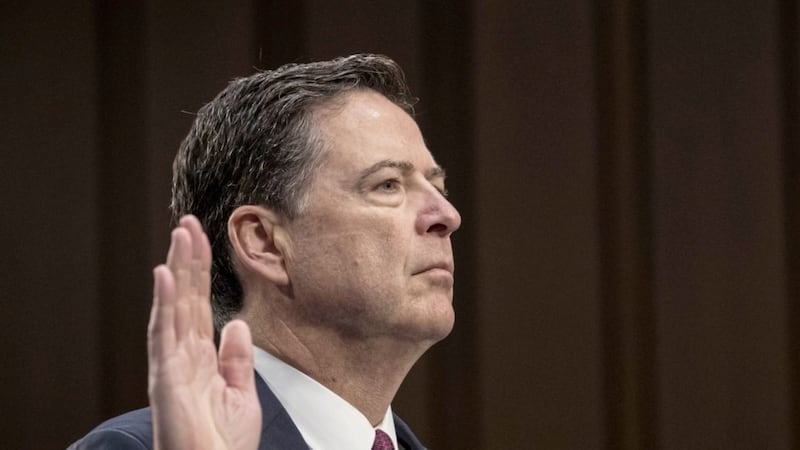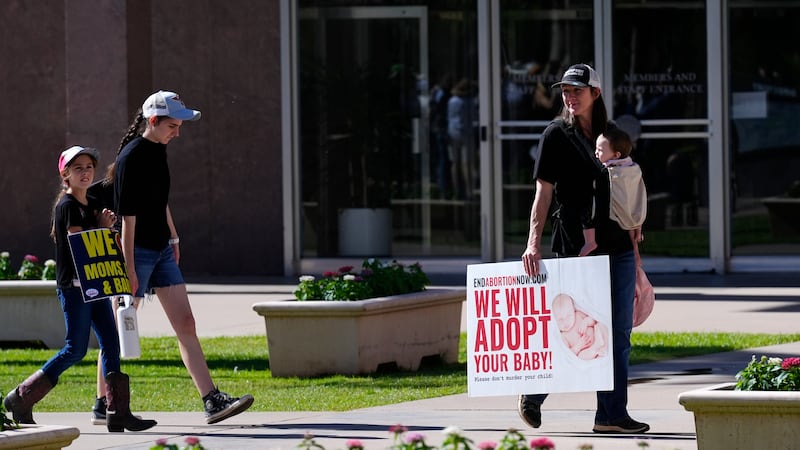US president Donald Trump claims the testimony of fired FBI director James Comey to Congress represents "total and complete vindication" in the Russian election-meddling political scandal.
Mr Trump, who had not posted on his Twitter account on Thursday as Mr Comey accused the administration of spreading "lies", struck back with an early morning tweet in which he said: "Wow, Comey is a leaker."
Mr Comey had laid bare on Capitol Hill months of distrust of the president, bluntly asserting that Mr Trump had fired him to interfere with the probe of Russia's ties to the Trump campaign.
At his first congressional appearance since his abrupt firing last month, Mr Comey also revealed that he had orchestrated the public release of information about his private conversations with the president in an effort to further the investigation.
President Trump's tweet said: "Despite so many false statements and lies, total and complete vindication ... and WOW, Comey is a leaker."
Mr Comey's testimony, at a hugely anticipated hearing that captured the country's attention, provided a gripping account of his interactions with President Trump and underscored the discord that had soured their relationship.
He portrayed Mr Trump as a chief executive dismissive of the FBI's independence and made clear that he interpreted the president's request to end an investigation into his former national security adviser as an order coming from the president.
Though Republicans worked to discredit Mr Comey and to blunt the impact of his testimony, the ex-director's statement deepened questions about the basis for his May 9 dismissal and about whether President Trump's actions constituted obstruction of justice.
The veteran lawman expressed confidence that could be a matter ripe for investigation by special counsel Robert Mueller, though he declined to offer an opinion on whether it met such a threshold.
President Trump's private lawyer, Marc Kasowitz, seized on Mr Comey's admission that he had told Mr Trump on multiple occasions that he was not personally under investigation and maintained the testimony made clear that Mr Trump "never, in form or substance, directed or suggested that Mr Comey stop investigating anyone".
Mr Kasowitz also jumped on Mr Comey's revelation that he had released details of his private conversations with the president, casting the former FBI director as one of the "leakers" set on undermining the Trump administration.
Still, there was no doubt the veteran lawman made for a challenging adversary.
"It's my judgment that I was fired because of the Russia investigation," Mr Comey said toward the end of more than two hours of testimony before the Senate intelligence committee.
"I was fired in some way to change, or the endeavour was to change, the way the Russia investigation was being conducted.
"That is a very big deal, and not just because it involves me."
At one point, he practically dared President Trump to release any recordings of their conversations, a prospect the president once alluded to in a tweet.
"Lordy, I hope there are tapes," Mr Comey said, suggesting such evidence would back up his account over the president's.
Thursday's hearing brought Washington and other parts of the country to a standstill as Americans sat glued to their screens.
Republicans mindful of the gravity of the moment worked feverishly to lessen any damage from the hearing.
They tried to undermine Mr Comey's credibility by issuing press releases and even ads pointing to a past instance where the FBI had to clean up the director's testimony to Congress.
In his opening statement, Mr Comey sombrely accused the Trump administration of spreading "lies, plain and simple" in the aftermath of his abrupt ouster, declaring that the administration "chose to defame me and, more importantly, the FBI" by claiming the bureau was in disorder.
He then dove into the heart of the fraught political controversy around his firing and whether President Trump interfered in the bureau's Russia investigation, as he elaborated on written testimony released a day earlier.
In that testimony, Mr Comey said that President Trump demanded his "loyalty" and directly pushed him to "lift the cloud" of investigation by declaring publicly the president was not a target of the FBI probe into his campaign's Russia ties.
He said that when President Trump told him he hoped he would terminate an investigation into Michael Flynn, the ousted national security adviser, he interpreted that as a directive.
"I mean, this is the president of the United States, with me alone, saying, 'I hope' this," he said.
"I took it as, this is what he wants me to do."
He said that while he found the February exchange in the Oval Office disturbing, "that's a conclusion I'm sure the special counsel will work towards, to try and understand what the intention was there, and whether that's an offence."
Mr Comey said that after his firing he actually tried to spur the special counsel's appointment by giving a damning memo he had written about a meeting with Trump to a friend to release to the media.
"My judgment was I need to get that out into the public square," he said.
The February meeting was one of several one-on-one encounters that Mr Comey said made him feel such intense discomfort that he felt compelled to document them in memos.
"I was honestly concerned that he might lie about the nature of our meeting, so I thought it really important to document," he said.
"I knew there might come a day when I might need a record of what happened not only to defend myself but to protect the FBI."
President Trump himself was expected to dispute MR Comey's claims that he demanded loyalty and asked the FBI director to drop the investigation into Flynn, according to a person close to the president's legal team.
Instead, Mr Kasowitz pushed back and the president remained conspicuously silent on Twitter during the hearing despite expectations he might respond.
Meanwhile, Mr Trump's son-in-law and adviser Jared Kushner is expected to meet with staff from the Senate intelligence committee in coming days, according to a senator on the panel.
Mr Kushner is likely to be asked about his meetings with the Russian ambassador to the United States.
Senator Angus King, who is a member of the committee, says Mr Kushner will have a face-to-face meeting with panel staff as early as next week.
A spokeswoman for Senator King on Friday confirmed the senator's comments in an earlier interview on CNN.
A Trump administration official says no meeting had been formally scheduled and discussions about possible dates were ongoing.
Congressional staffers say the committee would reserve the opportunity to ask Mr Kushner for documents or to answer further questions at a later date.



